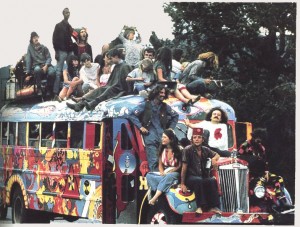
The Baby Boomers when they were Young
When I started to work in 1976 I never heard of something called HRM. My boss hired me.
He discussed my salary and gave me the assignments.
The salary of my colleagues was a secret. I also did not know why my salary was raised. It just happened.
Three years later I was promoted to manager (group leader). I was very surprised this happened.
My new manager (called a section leader) handed me the files of my employees. I had to take care of them.
They contained many secret documents about what the former managers thought about the employee. At that time the managers talked about the employees in complete secrecy.
We, the New Managers, did not like that. We opened up the secret files, destroyed the ”not-objective” data, standardized the data and put the data in a Database later called a HRM-System.
Suddenly I was the one who was responsible for hiring and firing. Every group-leader was different. I was always very open to my employees. We worked as a team to create and maintain software-systems.
I loved to program and design and I never felt the need to stop this. Managing my group was simple. It took about 1 day a week. In this day I had to attend meetings with other managers.
Other group-leaders (mostly much older) were spending all of their time managing their group. I soon found out that they were really managed by their group. They were unable to resist the informal power of some of their employees. When the new salaries were fixed some of them got a lot of money. This became known in my group and I got into trouble.
Why is he paid more than I am paid? He is really doing nothing!
I went to talk with my colleague but he did not want to talk. I talked with my section-leader and I found out that my colleague was his personal friend. He “covered his ass“.
At that time there was a big difference between an employee and a manager. When you became a Manager you became part of an Elite with its own Privileges and Culture. The most important Rule was that people of this Elite always covered the ass of the other members. We, the New Managers, did not like that and we started to destroy the Old Management Culture.
The other group-leaders experienced the same situation. We started to talk about this issue at our Section-meeting. After many discussions we went to talk one level higher (the director). The end result of all our actions was a revolution. We removed all the old powers and took over.
This also happened when I was a student. I was part of the baby-boom-generation that reorganized society. We were the revolutionaries that wanted to create a better society based on the principles of the new age of Aquarius.
Now almost 30 years later my old colleagues and I have created a System that is blocking everything they stood for. Just like my section-leader they want to stay in power.

The Baby Boomers when they were Young
The big difference between 30 years ago and now is that the New Revolutionaries have to change a (Software) System. It is impossible to detect the Human Cause of all Evil.
We, the Baby-Boom Managers have standardized almost everything. The Systems have taken over Control and the Sad Thing is that almost nobody knows what the Systems are really doing. They live a Life of their Own.
It is almost impossible to reach consencus because many many specialized managers are involved and they all defend their own territory. The Sad Thing is that almost nobody knows what their Territory really is about.
Everything is Magically connected to Everything Else by the PatchWork of Overlapping Systems. A Problem in One Area suddenly comes back in a completely different Area.
The only way to accomplish something is to play the Game of Politics. To play the Game of Politics you need to make friends and you have to stay in the right coalition.
To do this you sometimes have to abandon your friends to reach the Goal. The effect is that nobody trusts nobody anymore or friends are covering the Ass of their friends. The effect is that many incidents are covered up. The effect of the cover up is that many people don’t know what is really happening or (worse) many people know what is happening but discuss the issues in a secret place.
The effect of this is that many people are not working at all. They are gossiping all the time. The effect is a loss of productivity and the only Solution we can think of is to implement more Systems.
The most important effect is a Change of Focus. The focus is directed inside the Company and not outside the Company. Outside the Company somebody is providing the money to play the Game. He or She is called the Customer.
The Systems have transformed the Customer into a Standardized Object stored into a Computer.
The Systems have completely Blocked the View on the most important Asset of a Company, the Human.
What Happened?
We developed a system that wanted to treat Everybody the Same Way.
How did we do that?
Step 1: Classify what everybody is doing (programming, designing, project-management …).
Question: When somebody is capable of everything (a talent) what do you do?
Answer: Always start with the lowest classification in this way people believe work is moving Up.
Step 2: Define a Career Path.
Step 2.1. Define Low (junior), Normal and High (senior). Take care that this is a normal distribution. If you do that people keep the believe that a Senior is better than a Junior!
Step 2.2. Define importance. A designer is more important than a programmer. Manager is more important than designer.
Question: Why is a something more important than something else?
Answer: Something is more important when we pay a higher salary. If we do that people start to believe that money is the most important motivator.
Effect: Everybody wants to become a manager because a manager is the best! The negative effect is that a manager does not like the employees in his department who are better. They are his competitors.
Step 3: Define a test to prove you are allowed to move to the next level.
Question: What defines a talented programmer?
Answer: He has finished his training.
Effect: Employees have to spend a lot of time to pass exams. Training becomes more important than experience. People start to act out of the book.
Step 4: Create specialized departments (Training, Security, Data Management, ..).
To save money we started to train people outside the company. The teachers did not have any experience. They knew what was written in the books that were written by people that did not have any experience in the field they were teaching.
Later the teachers changed into consultants and started to tell the employees and the managers how to do it. Doing the trick is easy. Inventing new tricks and implementing the new tricks becomes very difficult. You have to convince many managers.
Effect: Innovation is tricky bussiness. You have to take a risk and when you fail you are out of the carreer-race. Old approaches are implemented with a different name.
Step 5: Create departments that are testing if the employees are doing what the trainers told them to do (Quality Management). When they don’t do what the trainers told them to do we just don’t promote them.
Effect:
Everybody is Equal.
I hope you see what I am trying to show you. By treating everybody the Same Way we finally have created the Same People. The top (talent) and the bottom (sick, problems at home …) are gone.
We have Equalized the Population.
The steps 1 to 5 are not the only steps. The System has improved itself all the time.
Before the division employees took care of other employees. We have designed a special approach to take care of the sick and other causalities. This has given them a negative status. The effect is that some of them deteriorate and others are afraid to tell what the matter is. They go one when they are sick or they ignore the problems at home. The effect is more problems at home and/or stress-related diseases (Burn-Out).
We have divided managers in groups. Some of them manage resources (!) other use the resources. The effect is the loss of the team-mentality.
We have divided resources into internal and external resources. We hire them from a specialized company. The effect is a loss of company-pride a higher level of the team-mentality.
We have automated almost everything to speed up efficiency. The effect is that we have to know the number (the unique identifier) to know about people. We are unable to enter unique information about a person. They are standardized on a higher level.
We have created a special department called HRM. They are managed top-down. The effect is that at every level we are unable to create a unique solution for a unique situation.

The Baby Boomers when they were Young
What To Do?
Work in teams.
Start to talk with the employees again. Be honest and open.
When you feel somebody is special give him a special treatment. Explain this to everybody.
Don’t be afraid to take responsibility for what you have done. Admit mistakes.
Don’t store everything in a database. Forgetting something is a positive thing. It makes is possible to start all over again.
Don’t specialize too much. Get rid of all the departments that are too far away from your primary process, servicing the customer.
Rotate. Don’t keep a person too long in a specialized job. Give experienced people a change to teach or to specialize but never keep them in this job for long.
Stop politics. Never allow that people are playing games with people. Fire people who are playing dirty games.
Surprise people. Don’t plan careers. Give everybody the idea that everything is possible.
Stop the gossiping. Give everybody a change to tell what they don’t like and listen.
Demote. When somebody is incapable to do his job give him the job he is capable of and give him the salary of the job. This stops the expectation that everything always has to move up. When somebody gets into trouble when he is demoted make an exception.
Give employees a chance and the time to help other employees.
Don’t hire too much people outside your company. Give priority to teach your own employees to learn the trick of the outside specialists.
Give your own people the time and the tools to innovate.
Hire outside specialists to do the things that are already stable and repeatable or better automate these activities. They are most of the time very boring. This is a very usefull indication to use IT.
LINKS
About Long Term Cycles
About Vocation
About the Calvinistic Work Ethic
How to Destroy your Company by Implementing Packages
How the Baby Boomers were Educated
About Knowledge Workers
About the Effects of the French Revolution
Why the Industrial Revolution was a Social Revolution
About the Struggle of the Classes



